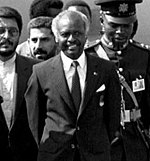Canaan Banana, Date of Birth, Place of Birth, Date of Death
TweetCanaan Banana
1st President of ZimbabweAbout Canaan Banana
- Canaan Sodindo Banana (5 March 1936 – 10 November 2003) was a Zimbabwean Methodist minister, theologian, and politician who served as the first President of Zimbabwe from 1980 to 1987.
- He was Zimbabwe's first head of state after the Lancaster House Agreement that led to the country’s independence.
- In 1987, he stepped down as President and was succeeded by Prime Minister Robert Mugabe, who became the country's executive president.
- In 1997, Banana was outed as a homosexual, and after a highly publicised trial, was convicted of 11 counts of sodomy and "unnatural acts", serving six months in prison. Banana was born in Essexvale (today Esigodini), a village in Matabeleland, Southern Rhodesia, to an Ndebele mother and a Mosotho father.
- He was educated at a mission school before studying at Epworth Theological College in Salisbury (today Harare).
- Ordained in 1962, he worked as a Methodist minister and a school administrator between 1963 and 1966.
- He was elected Chairman of the Bulawayo Council of Churches in 1969, holding that position until 1971.
- From 1971 to 1973, he worked for the All Africa Conference of Churches and was also a member of the Advisory Committee of the World Council of Churches.
- He became involved in anti-colonial politics, embracing black liberation theology and criticising the Rhodesian government under Ian Smith, which had declared the country independent under white-minority rule in 1965.
- He became Vice-President of the African National Congress, but soon was forced to flee Rhodesia.
- He first went to Japan, before moving to Washington, D.C., United States, where he studied at Wesley Theological Seminary. Upon returning to Rhodesia in 1975, he was imprisoned until 1976.
- That year, he accompanied Mugabe to the Geneva Conference, and in 1979, he attended the Lancaster House Conference in London that resulted in Zimbabwe's independence as a majority-rule democracy.
- In 1980, he became the country's first President, stepping down in 1987 so that Mugabe, who reformed the presidency from ceremonial office into an executive one, could succeed him.
- Banana then worked as an Organisation of African Unity diplomat and also taught at the University of Zimbabwe.
- He also played a major role in arranging the union of the two main Zimbabwean revolutionary groups turned political parties, the ZAPU and his own ZANU, which merged in 1988 to form ZANU–PF, which is still the country's ruling party. In 1997, Banana was arrested in Zimbabwe on charges of sodomy, following accusations made during the murder trial of his former bodyguard, who had killed another officer who had taunted him about being "Banana's homosexual wife".
- The charges related to allegations that Banana had misused his power while he was president to coerce numerous men into accepting sexual advances.
- Though he denied the accusations, he was found guilty of eleven charges of sodomy, attempted sodomy and indecent assault in 1998.
- He served eight months in prison, and was also defrocked.
- He died of cancer in 2003, with sources varying on his place of death. Banana was a controversial figure, especially after his criminal conviction.
- As President, he did not always command respect (a law had to be passed in 1982 to prevent Zimbabweans from joking about his surname).
- Nevertheless, he was held in esteem by some for his involvement in Zimbabwe's liberation struggle and later for his role in uniting ZANU and ZAPU, which ended the Gukurahundi massacres.
- After his death, Mugabe called him a "rare gift to the nation."
Read more at Wikipedia
See Also
- Famous People's Birthdays on 05 March, Zimbabwe
- Famous People's Birthdays in March, Zimbabwe
- Famous priest's Birthdays on 05 March, Zimbabwe
- Famous priest's Birthdays in March, Zimbabwe
- Famous politician's Birthdays on 05 March, Zimbabwe
- Famous politician's Birthdays in March, Zimbabwe
- Famous diplomat's Birthdays on 05 March, Zimbabwe
- Famous diplomat's Birthdays in March, Zimbabwe
- Famous university teacher's Birthdays on 05 March, Zimbabwe
- Famous university teacher's Birthdays in March, Zimbabwe


 Date of Birth:
Date of Birth:  Place of Birth: Esigodini, Zimbabwe
Place of Birth: Esigodini, Zimbabwe